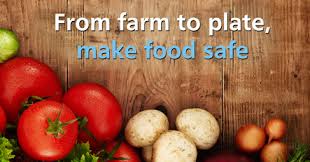
Consuming unsafe foods pose a significant public health threat in the African Region. Infants, young children, pregnant women, the elderly and those with underlying illnesses are particularly vulnerable.
Food and water containing harmful bacteria, viruses, parasites or chemical substances are responsible for more than 200 diseases, ranging from diarrhoea to cancers. Meats, seafood, cooked rice, cooked pasta, milk, cheese and eggs are common types of food that can become unsafe very fast.
On the 7th of April 2015, the World Health Organization will dedicate World Health Day to the issue of food safety with theme of “From farm to plate, make food safe”. This provides an opportunity to educate consumers and alert governments, manufacturers and retailers about the importance of food safety and the part actors in the food chain, from farm to plate, can play in ensuring that food is safe to eat.
The most common symptoms of foodborne illnesses include stomach pain, vomiting and diarrhoea. Symptoms may occur very quickly after eating the food, or may take days or even weeks to appear. For most foodborne illnesses, symptoms occur 24-72 hours after the food has been eaten.
The smell, taste and appearance of food and water are not good indicators for determining whether they will make you sick. Just because something looks safe to eat does not mean that it is. It takes over 2.5 billion bacteria or germs to make 250 ml of water look cloudy, but in some cases it only takes 15-20 bacteria to make one sick. Similarly, the accumulation of invisible germs on one’s hands is a common source of transmission that is often overlooked.
This highlights the urgent need to wash one’s hands before and after handling food and after going to the toilet. If a food handler is infected with a virus and continues to prepare food, this virus may be passed on to the consumer via the food.
Unfortunately though, many people do not wash their hands properly. When washing hands, pay special attention to finger tips, fingernails, thumbs, wrists and in between fingers. While washing with soap and water is ideal, many people who do not have access to soap or detergent can use coal ash as a substitute.
Also, it is important to not handle or prepare food if you are experiencing symptoms of a foodborne disease. If this cannot be avoided, wash your hands with soap and water first and frequently during food preparation. Keeping your hands clean is the first in the five keys to safer food developed by WHO to highlight the most important ways to make food safe.
New food handling practices have evolved as a result of our increasingly globalized world. A longer food chain, changes in technology, and antimicrobial resistance all increase the risk of foods becoming contaminated.
Although, antimicrobials, such as antibiotics, are essential to treat infections caused by bacteria, their overuse and misuse has been linked to the emergence and spread of resistant bacteria, rendering the treatment of infectious diseases ineffective. As a result, antimicrobial resistance is increasingly becoming a bigger threat to the effectiveness of modern medicine.
Unsafe food has put major strains on health systems and has hurt national economies, development and international trade in the African Region. Much work has been done by WHO in the past to prevent these consequences from happening.
WHO will continue to support governments to make food safety a higher public health priority to address these challenges through improving prevention, detection and response to health threats associated with unsafe food.
WWW.afro.WHO.INT For more information, please contact:
Technical contact:
Dr Mohamed Sheriff; Tel: +472 413 9943; Email: [email protected] This e-mail address is being protected from spambots. You need JavaScript enabled to view it
Media contacts:
Dr Cory Couillard; Tel: + 472 413 9995; Email: [email protected] This e-mail address is being protected from spambots. You need JavaScript enabled to view it
Mr Collins Boakye-Agyemang; Tel: + 472 413 9420; Email: [email protected]




